Table of Contents
Using the right tools will make or break your digital PR campaign, and our digital PR agency is using the powerful suite of tools provided by BuzzStream to revolutionize and constantly experiment with our approach to outreach, digital PR, and link building more generally.
In this case study, we explore how BuzzStream has helped the team of 70+ digital PR specialists working at Reboot Online earn more than 30,000 pieces of organic coverage for our clients. We also look at the insights and data generated from our recent BuzzStream-powered analysis of 1,000 subject lines sent to 29,095 journalists.
The Fight for Attention in Digital PR
A journalist’s inbox is a battleground where digital PR professionals must fight for a finite amount of time, attention and engagement.

Helpful tools like BuzzStream have made large-scale outreach easier than ever, and this alone has had a hugely positive impact on the speed and efficiency of digital PR.
However, just sending a well crafted outreach email is no longer enough.
Journalists receive literally thousands of emails per day, and the outreach email means nothing if the person receiving it never opens the message to read your pitch.
Thankfully, tool providers have invested heavily in building out a robust suite of tools to help the most effective digital PRs refine their approach and maximise the success of their outreach campaigns.
Innovative features and functionality contact information discovery and imports, intuitive prospect list management systems, outreach personalisation and data-driven reporting dashboards have continued to move the industry forward and help all of us working in the space send the right email, to the right person, at the right time.
https://www.buzzstream.com/outreach/report/How Reboot Online is Using BuzzStream to Earn More Coverage & Links
Before we dive into the findings from our 1,000 subject line study, we first want to speak about just a few of the ways that BuzzStream is helping the Reboot Online team deliver more effective digital PR campaigns at a serious scale.
List Building & Digital PR Prospecting
Reboot has been offering digital PR services to clients for over 5 years now, and in that time we have tried virtually every media database and list building/prospecting tool that you can think of.
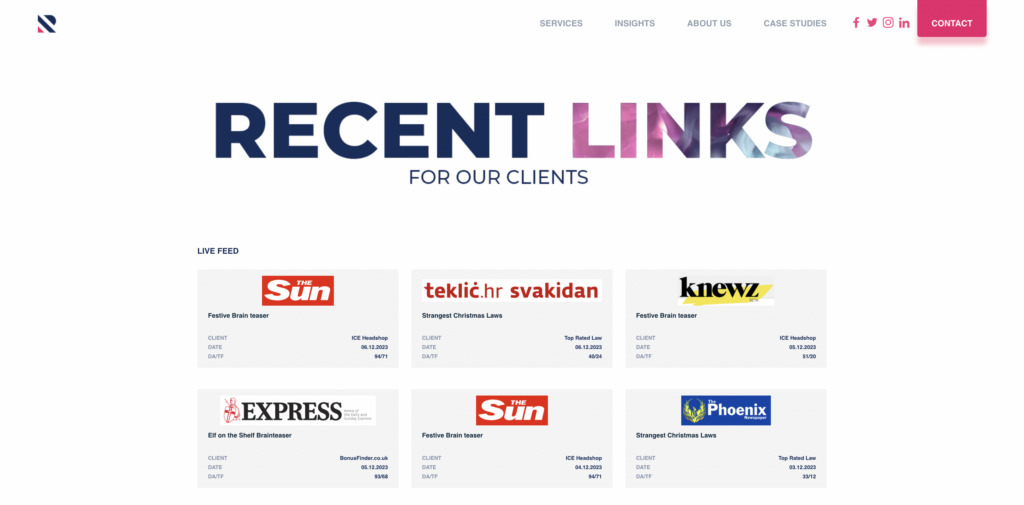
When running our campaigns we have come across good list building tools, and we’ve come across bad ones. What sets the BuzzStream listing building and prospecting functionality apart is the level of detail and relevancy that it helps us bring into our media lists.
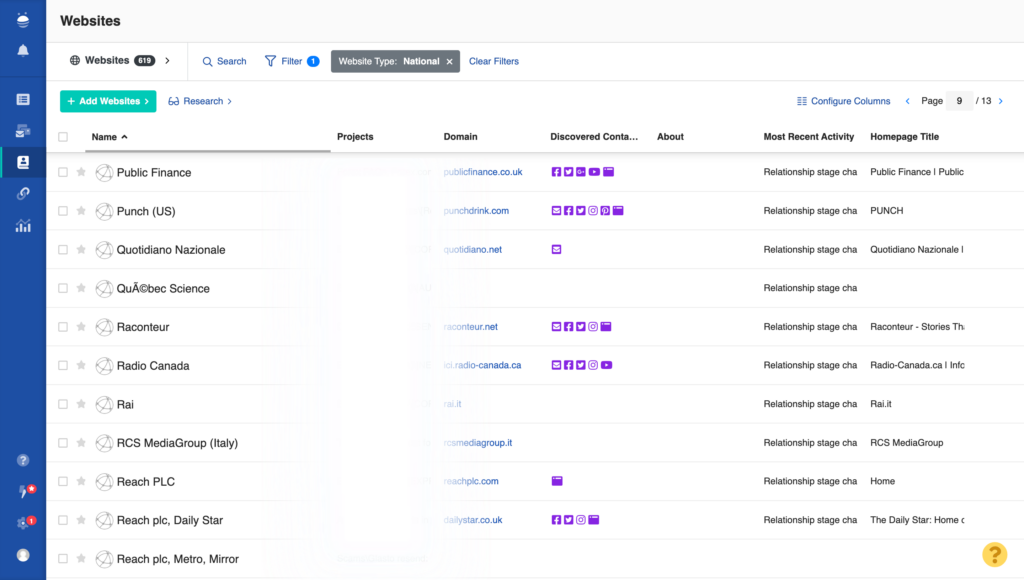
Mass outreach campaigns to any and every journalist that might have ever mentioned an industry related keyword in one of their articles yielded decent results for a time, but every PR under the sun now knows how to use this approach so the link and coverage conversion rate using such a strategy will be frustratingly small.
With BuzzStream, the details that we can store about each contact in our media list by default helps us ensure that we’re not outreaching to irrelevant people (and risking our emails being marked as spam), and the option to add custom fields to tailor BuzzStream to our unique outreach approach and methodology has really streamlined our processes internally.
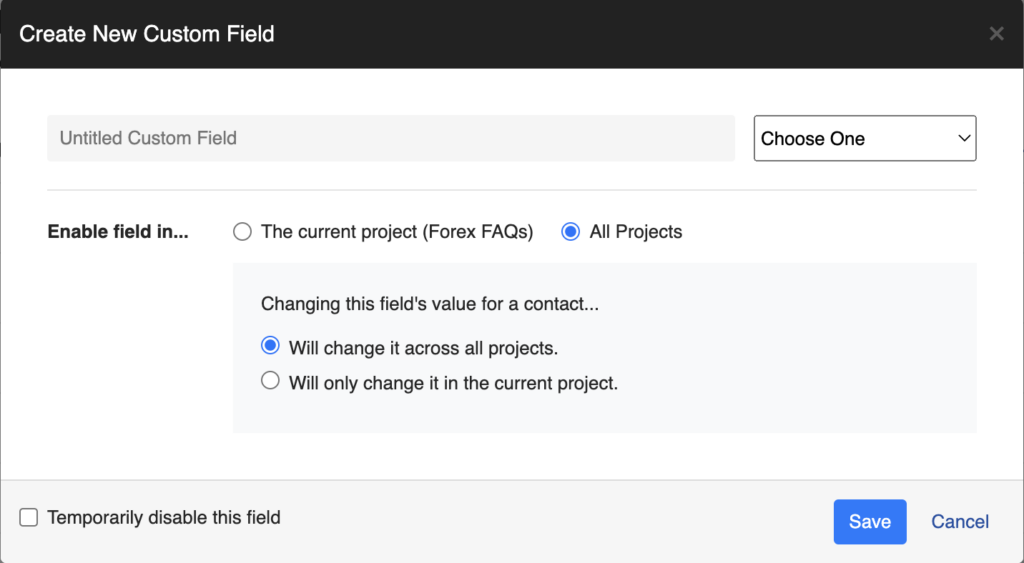
We are already using custom fields to keep tabs on the outreach campaigns across different types of clients, team members, and more detailed journalist profiling.
Streamlined Outreach & Email Personalisation
BuzzStream’s outreach functionality is second to none. The tool helps save countless hours which would otherwise be spent manually writing and sending emails to our contacts.
By building effective outreach sequences, we can ensure that follow ups are taken care of and that our outreach emails reach the journalists that we’re sending them at a time when they’re most likely to be noticed and opened.
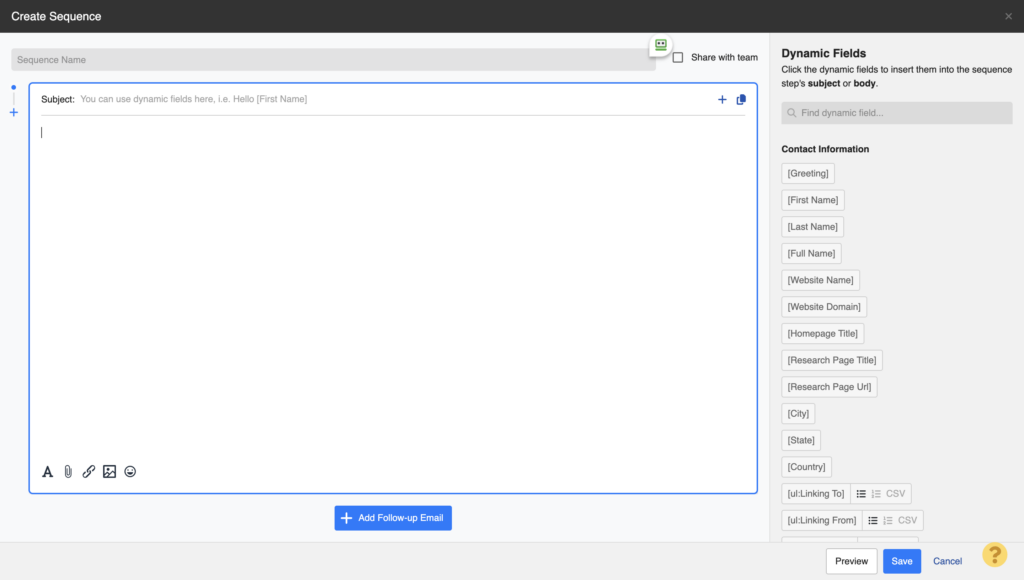
Having the mailboxes right there in the tool also means we’re not constantly switching between tools and apps when trying to respond to journalists that do want to use our data and content and/or feature our clients in their article(s).
Digital PR Reporting & Testing
Bounce backs, open rates, link clicks and coverage earned. There is so much data available to the modern day digital PR professional.
To put it shortly, gaining useful insights from all of our outreach and digital PR data will help us earn more and better pieces of coverage for our clients. In fact, this is why we’ve invested so heavily into our data analysis team (which now consists of 10 data scientists).
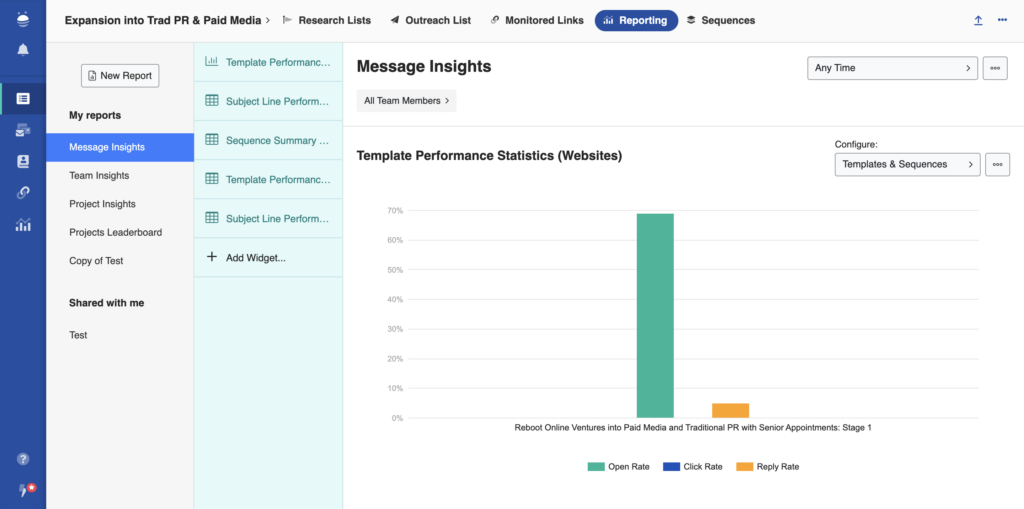
We find BuzzStream not only useful for planning and outreaching our campaigns, but for reporting on how effective they are and/or testing various outreach approaches too.
Having insightful and intuitive charts and graphs at our fingertips makes understanding how our campaigns are performing a breeze, and being able to dig into the data and see exactly which contacts have opened our emails, responded to them, clicked the links in our message etc. makes it that much more usable and useful.
Findings From Our BuzzStream-Powered Study of 1,000 Subject Lines
Note from the Editor: We spoke with Reboot Online’s Head of Digital PR, Helena Maniglia, on our podcast about this study in more detail.

Now that we have spoken about some of the ways that we’re using BuzzStream in our day-to-day digital PR work, we also wanted to quickly touch on how the tool is helping us experiment and test our digital PR theories and ideas (this is important for all agencies but especially Reboot since we’re always experimenting to improve our knowledge and understanding across SEO and digital PR).

As mentioned, we used the BuzzStream tool to study more than 1,000 subject lines which were targeting a variety of topics such as finance, property, lifestyle, travel and entertainment.
Our goal in this experiment was to identify the ideal subject line length, and the styles that journalists are most likely to engage with. BuzzStream’s email activity tracker was then used to gain insights on open rates for each type of subject line, allowing us to draw conclusions on which kinds of subject lines are likely to perform best in future campaigns.
Key Subject Line Findings & Takeaways
- Subject lines phrased as questions have shown 13% lower open rates compared to headlines without questions. This suggests that journalists may be more inclined to open emails with clear and straightforward subject lines.
- Surprisingly, starting subject lines with keywords such as ‘data’, ‘study’ or ‘survey’ at the beginning doesn’t have a significant impact on open rates, as it was just 1% higher compared to subject lines without these keywords.
- Like the research-based subject lines, listicle subject lines have only 1% open rates above those that aren’t written in listicle formats. This can be attributed to the fact that ranks or lists usually lack a stronger hook that will intrigue journalists enough to engage.
- Subject lines containing buzzwords such as celebrity names, events, and special dates had a 12% higher open rate compared to those that did not. This indicates that journalists are more likely to open emails with subject lines containing trendy words.
- Subject lines of 4 to 8 words tend to have higher open rates on average, with percentages starting to decline when they exceed 8 words. This suggests that emails with subject lines from 4 to 11 words are the best choice, likely because they are entirely visible in email previews.
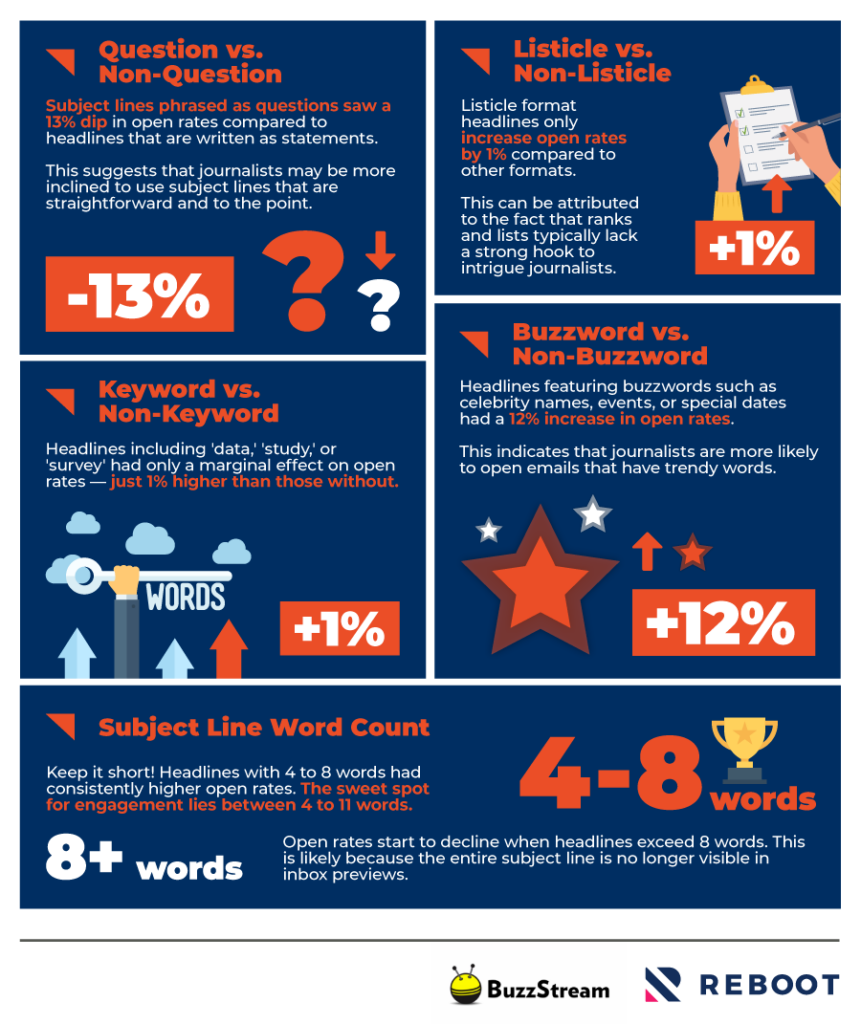
Our Methodology
For this study, we split our subject lines into 4 different groups. The open rates of each group were then analyzed and compared to all the other headlines. The groups consisted of:
Interrogative Subject Lines

Interrogative subject lines are those which ask a question, always including “?” at the end. For example:

Research-Based Subject Lines

Research-based subject lines are those that start with keywords like ‘data’, ‘survey’ and ‘study’. For example:

Listicle Subject Lines

Listicle subject lines are those that organize results in the form of rankings or lists. For example:

Buzzword Subject Lines

Buzzword subject lines are those that include current events, trends or celebrity names. For example:

5 Tips From Our Study to Write More Effective Digital PR Subject Lines
1. Prioritize relevance
A relevant headline will be directly aligned with the target audience’s interests, suggesting that the story will provide valuable information. Journalists open their email inbox searching for what’s newsworthy to their readers, so prioritize relevance above all else.
2. Be clear in your headline
Use simple words, be direct and ensure you’re communicating what your study is about. Find the right balance for a headline that will interest journalists enough to catch journalists’ attention, without risking being so vague they won’t understand it.
3. Keep it concise but avoid extremes
When analyzing BuzzStream open rates, Reboot saw that both short (2-3 words) and extremely long headlines (15+ words) resulted in lower open rates.
Very short headlines limit your ability to communicate what your story is about. Too many words may get cut off in email previews, making it difficult to grab journalists’ attention.
4. Make it reactive
When possible, make sure your campaign is relevant to current trends, as journalists are always looking for reactive content. Always consider including trendy keywords and elements such as popular celebrity names, events, and special dates.
5. Refine headlines before follow-ups
Use the BuzzStream open rates tracker to analyze the open rates of the first attempt. If they’re low, avoid following up with the same headline. Dedicate time to revising it. Ask yourself whether it clearly conveys the value of your story, and if it’s tailored and relevant to the target audience.
Conclusion
To cut a long story short, we would recommend BuzzStream to any digital PR looking to work more efficiently and effectively. Make sure that you explore all of the features and functionality offered by the tool, and once you have a decent amount of data in your dashboard why not try running your own studies like our one above!

 End-to-end outreach workflow
End-to-end outreach workflow



 Check out the BuzzStream Podcast
Check out the BuzzStream Podcast

